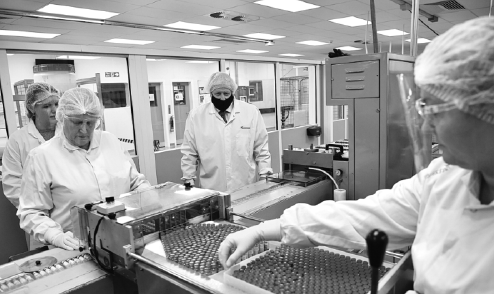Britain gears up to start vaccinations

LONDON-Britain on Wednesday became the first country to approve a COVID-19 vaccine from Pfizer and BioNTech and said it will be rolled out from early next week.
Britain had ordered 40 million doses of the Pfizer vaccine-enough for just under a third of the population as two shots of the jab are needed per person to gain immunity.
Health Secretary Matt Hancock said the vaccination will start early next week after it gets 800,000 doses from Pfizer's manufacturing center in Belgium. The speed of the rollout depends on how fast Pfizer can manufacture and deliver the vaccine.
Hancock said the vaccine will first go to the elderly, those in care homes and their caretakers, and to those who are clinically vulnerable.
A vaccine is seen as the best chance for the world to get back to some semblance of normality amid a pandemic which has killed nearly 1.5 million people and upended the global economy.
"The government has today accepted the recommendation from the independent Medicines and Healthcare products Regulatory Agency (MHRA) to approve Pfizer-BioNTech's COVID-19 vaccine for use," the government said.
Pfizer and its German partner BioNTech have said their vaccine is 95 percent effective in preventing illness, much higher than expected.
Distribution challenge
Hancock said hospitals were ready to receive the shots and vaccination centers would be set up across the country but he admitted distribution would be a challenge given that the vaccine must be shipped and stored at -70 C, the sort of temperature typical of an Antarctic winter.
Pfizer has said it can be stored for up to five days at standard refrigerator temperatures, or for up to 15 days in a thermal shipping box.
Other front-runners in the vaccine race include US biotech firm Moderna, which has said its shot is 94 percent successful in late-stage clinical trials.
Elsewhere in Japan, the country will give free vaccines to all of its residents under a bill passed on Wednesday. The country has secured vaccines from Pfizer, Moderna and AstraZeneca.
But scores of people in several countries including the United Kingdom are increasingly hesitant over the prospect of receiving a COVID-19 inoculation, new data showed.
There is concern among health experts that growing vaccine skepticism could jeopardize efforts to achieve herd immunity.
Multiple health departments are working on the assumption that a threshold of between 65 and 70 percent vaccine coverage will be necessary to control the spread of the virus.
A new survey from London-based consultancy Kantar found that 75 percent of respondents in the UK viewed vaccination favorably, down from 78 percent in June.
In the survey, 43 percent of respondents in the UK said they would "definitely" get a vaccination, while 32 percent said they would "probably" agree to it.
Agencies and Angus McNeice in London contributed to this story.

Today's Top News
- AI helping to redefine entrepreneurship
- China's judges enhancing global role
- FM calls for joint efforts to de-escalate Mideast tensions
- Bridging the last mile so that farm technology reaches field and table
- Opening-up remains key to nation's growth
- Reform unlocks China's silver dividend






























